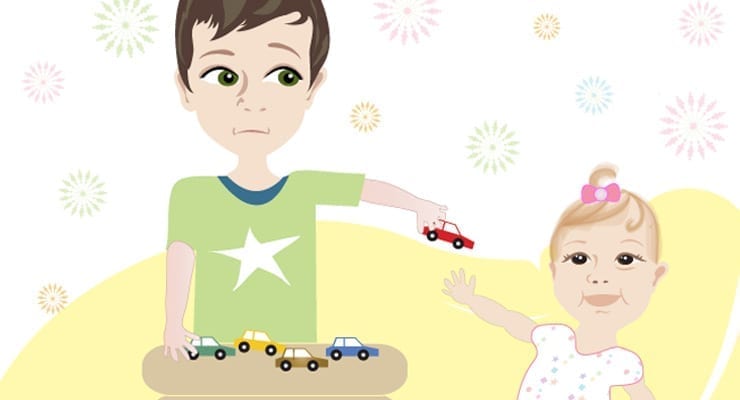“Don’t be yourself – be someone a little nicer.” – Mignon McLaughlin
My 3-year old son is crazy for cars. Tiny cars that fit in the palm of his hand. He got a big stash of them for Christmas from his grandmother, Sutzi. He lines them up in a pretend garage that is really an ottoman. He even has names for them. His favorite is Francesco.
His little sister Sienna loves cars too, because she loves everything big brother does – both good and bad. I try to explain to Alessio that he is teaching her all kinds of things, even when he doesn’t know it. I’m not sure how much he understands of these concepts, but at toddler age, repetition is the name of the game. Keep trying, I tell myself. He’ll get it one day.
In the meantime, I now have two kids crazy for cars. The showdown that takes place when I am momentarily distracted is a daily force to be reckoned with. Sienna is learning to push and grab. Alessio is learning to hide his favorite toys from her.
Kindness. Empathy. Generosity. Collaboration. Teamwork. These are the social skills needed for success in the 21st century. The kids who know how to listen, empathize, and work cooperatively with others are the kids who will be most successful in life.
A recent study at University of California Riverside assigned school children (aged 9-11) to perform three acts of kindness per week for 4 weeks. The kind acts were not targeted at classmates. Extra chores at home and hugs for mom were counted too. But at month’s end, the children who had done the kind acts were more popular and better liked by their classmates. The children were also happier.
For years, neuroscientists and psychologists have underscored the links between happiness, generosity, and good health. There is even a kindness gene that helps the human body better withstand stress and fear.
But how do parents teach kindness and empathy? Social intelligence must be learned through example and interaction with others. Practice makes perfect.
Model sharing. Show your child how to take turns playing with a toy. “You can play with the toy for 2 minutes and then it’s Johnny’s turn.” Use a timer to indicate when it is time to share. That way the timer becomes the enforcer, not you. And remember you’re the role model. Whether you realize it or not, your kids are watching you all the time. They’re looking to you for cues on how to speak and behave as they interact with the outside world. In other words, if they see kind, empathetic behavior being demonstrated by you, they’ll be more likely to display those same behaviors themselves.
Teach empathy. Help your child verbalize how his actions/lack of sharing have made others feel. Gently ask how he would feel if someone did the same to him. When children learn how to put themselves in another’s shoes, they begin to understand emotional interactions on a deeper level and are able to make better decisions next time.
Acknowledge their feelings. Let your child know that you understand how much she loves her toy and how, at times, it is difficult to share. If you offer a solution on how to share before your child feels understood, she is more likely to become frustrated. When feelings are acknowledged, they dissipate.
Pay attention to teachable moments. As many parents know, the most important lessons you’ll teach your kids happen in the everyday. The key to success for is paying attention to these moments and capitalizing on them when they happen. When you see someone showing kindness or empathy, point it out to your child and talk to him about why it’s a great example of what you expect from him.
In recent weeks, Alessio’s cars have begun to disappear. His giant pretend garage is nearly empty. The sibling rivalry is winding down, along with his toy fleet. “Where are all your cars?” I asked.
He shrugged and shook his head. “Don’t know.”
“Could it be that in hiding your cars from your sister, you have forgotten where you put them and are hiding them from yourself too?”
He smiled a crooked little smile and started to laugh. “I tink so.”
“You see,” I said. “When you don’t share, everybody loses.” Would he understand? I wondered. But it wasn’t long before I saw that Alessio was really getting it.
At pre-school, a tussle was going on over scooters. There were only two. Alessio was driving one, and a little girl the other. A new kid at school wanted to play too, but the little girl wouldn’t let him. When Alessio saw how sad the boy was, he gave him his scooter. Alessio’s small act of kindness grew into a new friendship, not just between the boys, but between our two families.
One never knows where kindness leads, except you can be sure: it always leads to good things.
Ciao,
Princess Ivana





